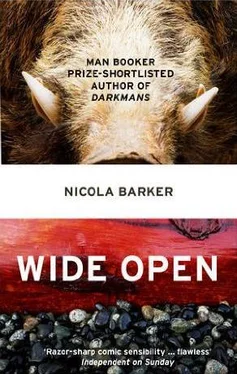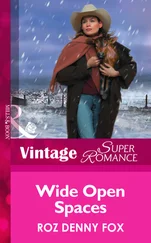“Why did he do that?”
Nathan was talking to himself. Connie didn’t understand. “Why did he do what?”
“Why did he befriend Ronny? Ronny doesn’t understand…” Nathan corrected himself. “I mean he didn’t understand. About friendship. I still get hate letters. From total strangers. I’ve not seen him for almost ten years. I’ve moved house twice. But still they find me.”
“That’s scary.”
“Yes it is.”
Connie had stopped glowing. When she’d come in she’d been glowing. But not now. She looked tired. Washed out.
“The point is,” she said, “my father saw fit to leave Ronny a bequest in his will. Money, basically. A nice amount.”
“A nice amount.” Nathan parroted, aimlessly.
Connie’s eyes tightened. “Do you want to know how he died?”
She was suddenly vengeful, like she needed to prove something. Her tragedic legitimacy, her righteousness. Nathan said nothing.
“He was waiting on the platform at Gravesend station for my mother. She’d been to Cheltenham races for the day with her lover. He was standing too close to the edge. Someone opened their carriage door before the train had slowed down. It hit him like a hammer. It killed him.”
“I’m sorry.”
“We were very close.”
Connie rubbed her hands together, like her fingers were cold or her knuckles stiff.
“But not close enough…” she faltered. “I wasn’t close enough to know anything about Ronny. Nor did my mother for that matter. And it actually felt kind of creepy. Especially when we found out that he was in prison, and then, shortly after, that he’d absconded. It felt sort of…”
Her eyes scanned the carpet near her feet, as though she might see the word she sought enmeshed in its fibres. Instead she saw only an empty wineglass, an ashtray, a tea stain and, poking out from under the sofa, a slip of paper. She focused on this as she completed her sentence. “It felt almost threatening.”
For the first time during the interview Nathan felt pity for the girl. He imagined that before this trouble her life had been smooth and shiny as new Tupperware. It was no wonder she was shaken. He cleared his throat. “If I were you I’d forget about the money. Ronny was never particularly materialistic.”
Connie remained unmollified. “Unfortunately it’s a legal matter, not a private one. A large portion of the money Dad bequeathed was tied up in my practice, which has left me in a slightly tricky position…”
Nathan could see how this might be the case. “As a kid Ronny always broke things,” he said, appearing to marvel in the memory of it. “I mean, he never grew attached to anything. He had no interest in money.”
“He broke things?” Connie’s voice was an echo, she wasn’t listening, she was trying to figure out what the slip of paper said. She saw an R and an O, an N and an N.
For some reason Nathan felt a touch of anxiety. “Not aggressively. It was never an aggressive act. Nothing like that.”
“Actually, I’d really like you to see something.”
Connie put her hand into a leather satchel she’d been carrying and withdrew a bundle of letters. She removed a ribbon that tied them together. She offered them to Nathan.
“What are they?” He stared at them fearfully, as if they might spit or bite or combust. As though they stank.
“Ronny’s letters.”
“I already said that I have no interest in Ronny’s letters.”
Yet for an instant Connie appeared not to understand him and leaned forward further, proffering the letters until, as seemed inevitable, they slipped from her grasp and cascaded down on to the carpet, forming a small paper puddle at her feet. She swore and knelt down to gather them up again.
Nathan felt a curious sensation of déjà vu . He didn’t move. He remained seated. He wanted nothing to do with these papers. They contained more secrets, more facts, and he’d had enough of secrets and facts in the past. A gutful. Connie picked up the letters and then surreptitiously included among their number the tantalizing slip of paper. She glanced over at him as she did so. Nathan seemed in another world. He was unfocused. He didn’t appear to notice. She stuffed the letters back into her bag and then smiled, the very image of angel-innocence.
“That wasn’t Ronny’s hand,” Nathan offered, eventually.
“Pardon?” Her smile froze.
“I said that wasn’t Ronny’s writing on those letters.”
“Oh,” she exhaled her relief, “I know.”
“But you said they were his.”
“I meant that they were written to him.”
“By your father?”
“No. I don’t really understand how it was that Dad ended up with them. The letters were actually from Ronny’s friend, Monica.”
Connie scanned Nathan’s face when she used Monica’s name for any sign of recognition. She detected none. His face was soft and sweet, whiskery and gingery. She put her hand into the pocket of the jacket she wore. She drew out a business card. It said: CONSTANCE SUMACH, OPTICIAN. Underneath was an address in Gravesend.
“Here.”
She stood up and offered Nathan the card, but he didn’t reach out his hand to take it so she laid it down on the nearest flat surface; a cardboard box which was propped like an apprentice side-table next to the sofa. Then she took hold of her bag.
Nathan stood up too. He wasn’t a tall man but by comparison Connie seemed tiny. A porcelain figure. A little Dresden shepherdess. And yet she was bold, he realized. He respected that quality. He accompanied her, without speaking, downstairs and out of his flat.
“Are you working?” she asked, just before taking her leave of him, “only I called round during the day last week and you were out.”
Nathan nodded. “I work for the London Underground.”
“Really?” She seemed interested.
“I’m in Lost Property.”
Connie grinned. “That seems fitting.”
Nathan had idly noticed that Connie was glowing again. She was brightly painted. She glimmered.
“Fitting?” he said. “How?”
“I don’t know. I suppose it’s slightly…uh…”
She knew what she wanted to say but she held it in. She backed off. She waved, suddenly jaunty. Nathan watched her as she walked down the road, searched for her keys, drew them from her bag and opened the door to a Renault Clio. Metallic blue. She’d been parked on a single yellow line and yet she’d not picked up a ticket.
She was very lucky. Not just a pretty face, either, Nathan told himself. She had the sharp eyes of an optician. She had a magpie’s eyes. Nathan smiled sourly to himself, because, although it was of very little consequence, so did he.
And that was ironic.
Lily couldn’t resist.
“WOTCHA!”
Ronny looked up. He stared at her. She was pumpkin-faced. She was an essential, a delectable product of this godforsaken place. She’d just skidded to a halt on her bike and had sprayed a fine mist of grit all over him. She’d hit the corner of his shell display. He wasn’t angry.
“What are you doing?” she asked, smirking.
“I’m laying out these shells.”
“Why?”
“Because I am.”
“What kind of an answer is that?”
Ronny rocked back on to his heels.
“You’re the girl who jumped into the sea,” he said, smiling. This gentle spar took Lily by surprise.
“How’d you know?”
“I guessed.”
“How’d you guess?”
Ronny smiled some more.
“Why are you smiling?”
“Because you have a dirty neck.”
“What?” Lily was offended. She felt her neck with her hand. Ronny watched this cheerfully and seemed not to notice the offence he’d given. He said, “I spoke to the fat man who smells of fish. He said you jumped into the sea. He didn’t know why. Jim said you were dirty. He was right.”
Читать дальше
Конец ознакомительного отрывка
Купить книгу












